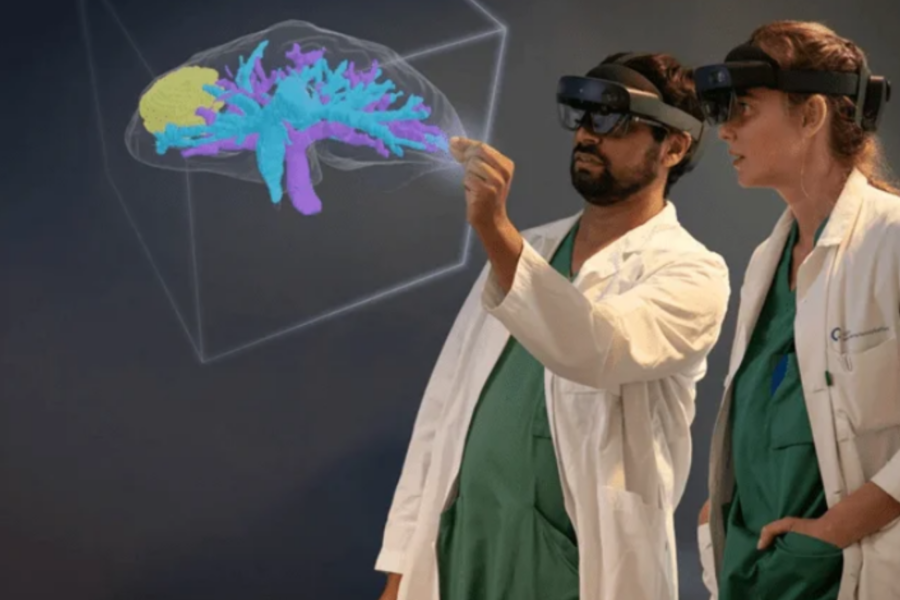
By leveraging cutting-edge 3D augmented reality (AR) technology, HoloCare aims to transform how surgeons visualise and interact with patient data, significantly improving the accuracy and success of complex surgical procedures. Malcolm Luker, Managing Director of HoloCare’s UK subsidiary, brings his extensive experience from senior roles in Genzyme, Philips, and various MedTech startups to steer this ambitious vision forward.
Strategic vision and collaboration with LTHT
HoloCare’s strategic vision is centred around two core objectives, which the company collaborates with Leeds Teaching Hospitals NHS Trust (LTHT) to achieve. First, the team evaluates the current CE-marked product to determine how it integrates with existing liver surgery workflows. Second, under an EU Horizon-funded project, HoloCare is working to prove the clinical insights and explore further advancements of AR and AI in liver and pancreatic surgeries.
This collaboration is a crucial step towards aligning HoloCare’s technology with the broader vision of improving digital health services within the NHS. By integrating AI into current and future products, HoloCare aims to make surgeries safer, more cost-effective, and capable of converting inoperable cases into operable ones. This approach reflects a shift towards more proactive, tech-enabled healthcare models that can overcome resource constraints.
Addressing critical gaps in surgical care
One of the significant challenges in surgical care today is the need for a unified viewpoint among surgeons when interpreting 2D images from CT or MRI scans. This can lead to conservative decisions, where surgeries are ruled out based on limited or misaligned data. HoloCare’s digital solutions aim to bridge this gap by accelerating the processing of these 2D images and presenting them as a comprehensive 3D model. This holistic view empowers surgical teams with a more accurate and aligned perspective of the patient’s condition, potentially increasing the number of patients eligible for surgery.
Patient-Centric innovation
Patient insights have played a critical role in developing HoloCare’s solutions. The overwhelming patient preference for curative treatments, such as surgery, over palliative care options like chemotherapy underscores the need for innovations that can make surgery a more viable option. HoloCare’s AI-driven software provides surgeons with an interactive 3D view of the patient’s anatomy, enhancing their ability to plan and execute complex procedures.
While the pilot phase does not currently involve direct patient participation, early feedback from the surgical team, gathered through live, online questionnaires, is invaluable. These insights are guiding the evolution of the HoloCare system, ensuring that it meets the real-world needs of clinicians and, ultimately, the patients they serve.
The transformative potential of AI and data
AI holds immense potential for surgical treatment and ongoing patient care. By harnessing clinical insights and experience, AI can refine and guide surgical procedures, making them safer and more personalised. One of the key expectations of the HoloCare project is that it will enable previously inoperable cases to become operable, offering new hope to patients with complex conditions.
The data generated from this project could have far-reaching implications for clinical decisions, medication management, and treatment personalisation. As AI continues to evolve, it will likely play an increasingly central role in driving improvements in patient outcomes across the healthcare sector.
Collaboration and stakeholder engagement
The success of the collaboration between HoloCare and LTHT can be attributed to several key factors. An open approach to collaboration, a shared commitment to innovation, and a history of successful multi-million-pound projects between key members of both organizations have laid a strong foundation for this partnership. This collaborative spirit is essential for developing and implementing digital health solutions.
Scaling and future expansion
HoloCare’s solution could be widely deployed across the NHS if the current pilot project proves successful. However, scaling this technology presents several challenges, including access to patient data within the framework of GDPR and cybersecurity concerns and securing funding for adopting new surgical approaches. Despite these hurdles, the potential for cost savings and improved patient outcomes makes the case for expanding this digital health solution compelling.
Broader implications for healthcare digitisation
The lessons learned from this pilot project can offer valuable insights for other NHS Trusts looking to integrate digital solutions into their care pathways. A key takeaway is the importance of considering the overall benefits to patient care rather than focusing solely on the incremental costs associated with new technologies. As the healthcare sector continues to embrace digital transformation, initiatives like HoloCare signal a significant shift towards more proactive and technology-driven models of care.
Looking ahead, the role of AI in surgical care is poised for a significant evolution. The potential for enhancing patient care and surgical outcomes is boundless by continuously incorporating clinical insights into AI development. HoloCare’s innovative approach exemplifies this potential and sets a new standard for the future of surgery.